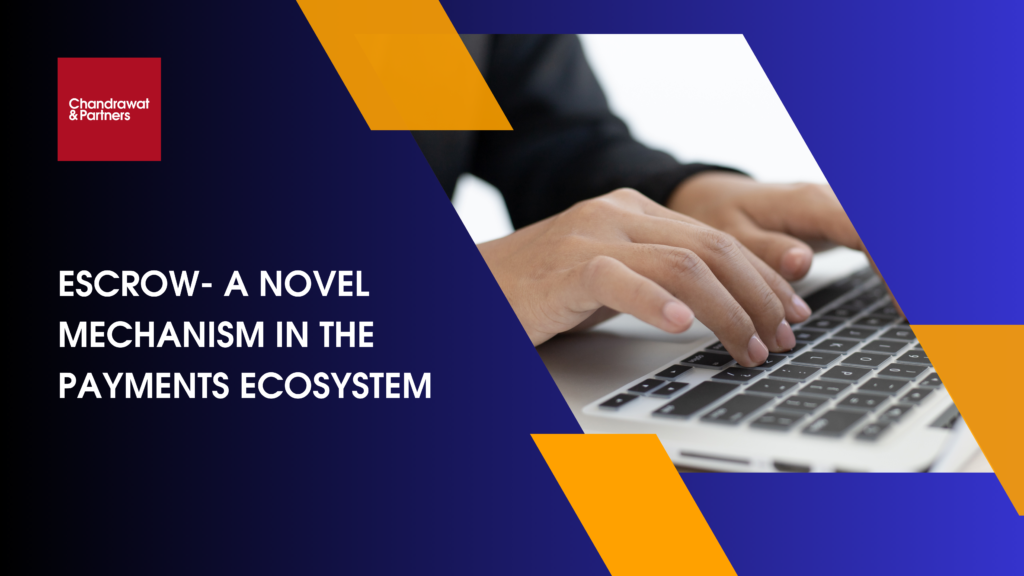Escrow-A Novel Mechanism in the Payments Ecosystem
Transactions between businesses have typically been dangerous. Parties to business transactions frequently struggle to transact in a secure, seamless, and safe way. The subsequent legal process may be drawn out and difficult if one of the concerned parties refuses to uphold the contract. When it comes to enforcing business contracts, India is ranked 163rd out of 190 nations.
India needs to switch to an “escrow”-based payments system to overcome this problem because it can guarantee a risk-free business climate and prevent business disputes.
What is an Escrow account?
An escrow account is a type of financial instrument in which a third party holds an asset or escrow funds on behalf of two other parties who are carrying out a transaction. Escrow accounts are used to store assets such as cash, securities, and money. Although it is a widely used idea, up until now it has only been used in merger and acquisition transactions. However, as technology advances and an internet-based economy grows, this tool is becoming more accessible as stakeholders from all industries use it for risk-free and secure transactions.
How Escrow accounts are creating a payment ecosystem?
Escrow-based payments are not new; they have been used for more than 150 years. They have mostly only been used in significant transactions, such as cross-border deals and mergers and acquisitions. Escrow account setup is a difficult process, but today’s clever escrow service providers use innovative technologies to build an accessible platform, democratizing the escrow service as a safe and secure payment method.
Escrow accounts are emerging as a distinctive and cutting-edge method that adds an extra degree of transparency to the ecosystem and promotes greater confidence.
Why involve a third party in a business transaction?
Typically, in a financial transaction, the buyer is more concerned with their investment and receiving items in good condition than the seller is with receiving money with certainty. Using the ‘escrow’ method of electronic payments, this need can be easily met. A buyer can use escrow to deposit money into an account at a bank that is overseen by a third party. Only after each condition in the financial agreement between the two parties has been satisfied does the third party release money from the escrow account to the seller.
Escrow account restrictions that prevent withdrawals until the predetermined commitments are met appear to be effective financial tools for resolving trust-based problems in industries like real estate. For the past many years, buyers, sellers, and real estate developers have been battling a culture of mistrust in the market. Anyone who has ever entered into a deal that is difficult to pull out of without losing the first payment may relate to the anguish of doing so. Similarly to this, the majority of dealers also experience difficulty collecting their entire payment from clients who retain their services after the purchase has been completed. But having an escrow system in place stops such questionable situations from happening.
Since the parties to a transaction may monitor the flow of money and the development of the contractual obligation, the escrow system’s step-by-step schedule eliminates guesswork from the transaction. Because the transactions are carried out under the proper supervision of care professionals, the buyers’ money and the sellers’ goods are kept in safe custody. An escrow platform is an excellent idea for reducing fraud in the areas of intellectual property, law, and the auto industry.
How can Escrow accounts help start-ups engage more customers?
Start-ups often find escrow accounts to be quite helpful in protecting their contingent-based transactions. Start-ups and rising firms can employ escrow payment techniques to reduce the risk for their unique use transaction situations, such as procurement, supply chain, professional services, etc. For start-up businesses, an escrow mechanism promotes hassle-free, effective, and secure commercial transactions and aids in their smooth expansion.
The safety of the escrow services’ activities is also determined by having the government organizations conduct routine audits. The regulatory push surrounding escrow is moving in the right direction, necessitating the development of a more open ecosystem for online payments. More people need to be made aware of the escrow facility and how a temporary, tripartite financial arrangement aids in the worry-free, secure transaction of two parties.
How we can help?
Our team can play an important role in facilitating an escrow service. Here are some ways that our team can help in escrow service:
Drafting and negotiating escrow agreements: Our team can help in drafting and negotiating escrow agreements that outline the terms and conditions of the escrow service. These agreements typically include provisions on the release of funds or assets, timelines for completion of transactions, and dispute resolution mechanisms.
Providing legal advice and guidance: Our team can provide legal advice and guidance to clients on the legal implications of escrow arrangements, including tax implications, fiduciary duties, and compliance with relevant laws and regulations.
Conducting due diligence: Our team can assist in conducting due diligence on the parties involved in the escrow transaction to ensure that they are legitimate and have the financial capacity to complete the transaction.
Facilitating communication and coordination: Our team can act as a liaison between the parties involved in the escrow transaction, facilitating communication and coordination to ensure that all parties are working towards the successful completion of the transaction.
Ensuring compliance with legal requirements: Our team can ensure that the escrow service complies with all relevant legal requirements, including anti-money laundering laws and regulations.
For more information or queries, please email us at
[email protected]




